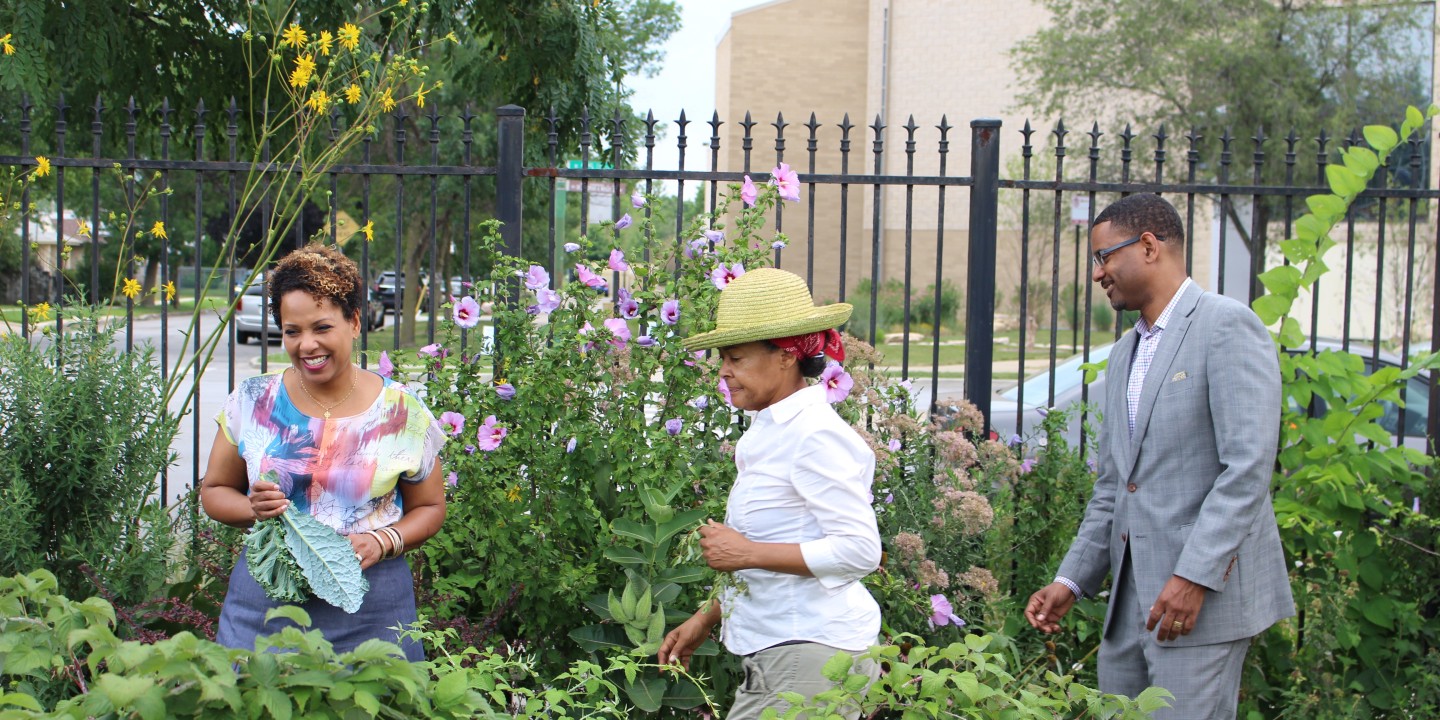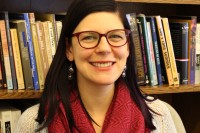Chicago church connects sustainable food, economic empowerment
At Trinity UCC, environmental awareness and racial justice are intertwined.

A mile and a half from Trinity United Church of Christ, along 95th Street in Chicago, is the recently dedicated site of the church’s Imani Village.
In the heart of the South Side, close by an expressway and the El tracks, Imani Village is a 27-acre project that will include a five-acre farm providing training for green jobs for people who have been released from prison. Plans also call for residential housing for seniors, athletics space for youth, and a primary care clinic focusing on preventative care offered through a partnership with a local hospital system.
Trinity UCC’s emphasis on environmental concerns is not secondary in its ministry—it flows from a green theology that shapes everything the congregation does.
A billboard on 95 Street promoting the farmers market Trinity sponsors carries the phrase “By any greens necessary,” echoing civil rights advocate Malcolm X’s words about the global black struggle for freedom.
“When we speak of environmental justice in the global economy, we’re talking about communities of color who will be adversely affected by climate change,” said senior pastor Otis Moss III. Additionally, “Africa, South America, and Asia have been utilized as a garden by European colonialism for over a century. Ecojustice is a way for everyone on the planet to recognize our common connection to the earth and our common connection to each other.”
Read our latest issue or browse back issues.
Moss describes the approach as theological biomimicry—looking to the earth as an example of how to build relationships that are not oppressive.
“When we recognize the interdependence and interconnection in nature, we begin to build human systems that are independent and interconnected, based on justice and love,” he said. “Nature recognizes that everyone has a purpose in the larger sacred economy. Capitalism doesn’t have that lens.”
This vision fuels their efforts to not only care for the earth, but to employ the marginalized and develop a just economic base for the community.
“It takes longer this way,” Moss said of the ministry, since it involves educating the congregation on why the cheapest building options aren’t always the best ones, as well as finding hyperlocal, black contractors who are able to connect with the vision.
The approach builds on Trinity’s legacy as a congregation that is “unashamedly black and unapologetically Christian.” Its longtime pastor Jeremiah Wright Jr., now pastor emeritus, was known for his prophetic preaching. Barack and Michelle Obama and their daughters attended Trinity when they lived in Chicago.
Trinity’s emphasis on green ministry began in earnest six years ago when it decided to renovate its building. Renovations are underway to make it certified in Leadership in Energy and Environmental Design by the U.S. Green Building Council.
Work is currently being completed on a green roof for the two-decades-old building—one that collects and cleans rainwater, among other benefits. Rosalyn Priester, a Trinity deacon and longtime member, was part of the multiyear $5 million fundraising campaign for the project. The congregation did a listening tour to share the idea with the community and for a year someone at each service spoke about why they gave.
“What is so marvelous about what’s happening at Trinity is that it’s not something that’s abstract, it’s real in our everyday lives,” she said. “It’s not something on the agenda to preach about a couple of times a year.”
Environmental sustainability was not initially familiar to everyone in the congregation, but church leaders have been consistent in describing it and embodying it over the years, she said. Projects such as changing the sanctuary lighting or using green building techniques for a new patio make that manifest.
“I see us still growing as a church and caring for the spiritual and the physical of our members, being concerned with them in a holistic manner,” she said. “That is an indication of the love for the people and the community.”
The congregation’s variety of green ministries strive to educate people and help them apply the knowledge, said Monica Brown Moss, Trinity’s village wellness coordinator.
“My whole focus is helping people prepare and enjoy real food as families,” she said. “I want people to discover the healing power of real food,” as opposed to “processed, packaged, preservative-filled” options.
She learned a green sensibility and use-what-you-have mentality from her parents and grandparents. “The whole idea of eating from the land, growing and cultivating, that was second nature to me,” she said.
When she moved to Chicago, she saw right away that people didn’t have ready access to healthy foods: “Fresh produce is cost-prohibitive for people and extremely limited in certain areas of the city. But we’re making progress.”
The farmers market is one way the church works for food justice. At the market, she and others give demonstrations on cooking healthy food and exercise. In this way Trinity’s green ministries serve both church members and people who live in the community. Last year the farmers market reached 2,500 people. This summer it was on track to reach 4,000.
The congregation has also turned land across from sanctuary that Monica Brown Moss described as “just a vacant, junky lot” into the George Washington Carver organic garden and Barbara Allen butterfly garden, named after a late minister of the church who loved butterflies. A mural in the garden honors George Washington Carver, who was born into slavery and became a botanist and innovator, and cites Amos 9:14 with the phrase “they shall make gardens and eat their fruit.”
Food from the garden contributes to the Kitchen, another ministry of the church, which offers breakfast and dinner every Sunday, including a healthy option that is increasingly popular. The Kitchen is working on having more of the food supplied by the farmers market. Once the farm at Imani Village is up and running, it will contribute as well.
In all of these projects and more, Trinity aims to build intergenerational connections and influence the next generations’ habits of healthy, sustainable living, Monica Brown Moss said. “We are trying to get our children to see that this is for their children.”
A version of this article appeared in the print edition with the title "Chicago church pursues environmental justice 'by any greens necessary.'"







